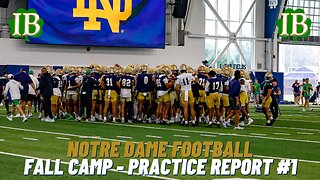Premium Only Content

Guy Chet__the literary and military career of Benjamin Church
The military adventures of the English colonists in New England illuminated the tensions between American conditions and European military conventions. Successful Indian attacks on colonial forces have led some contemporary and modern observers to conclude that the combination of firearms and Indian tactics was too potent for English forces, relying on conventional European tactics. Consequently, it has been argued, exposure to Indian tactics improved the effectiveness of English military forces, as battlefield experience forced colonial commanders to “unlearn” what their European military manuals had taught them. Thus, only by utilizing the Indians' tactical methods against them were colonial commanders able to reverse the tide of Indian victories, achieve tactical success against Indian forces and, consequently, attain victory.
This “Americanization” thesis, which fits neatly into the construct of American Exceptionalism (the historiographical notion that the United States is suigeneris, rather than an extension of European history and culture), is based primarily on the reputations of Benjamin Church and Robert Rogers as successful and innovative Indian fighters. Yet the military records of both did not impress their peers and superiors (in provincial and imperial military establishments), although their literary accounts of their exploits certainly did win them both fame as popular heroes and professional respect as commanders among the general public and nationalist historians of the nineteenth century.
The misadventures of provincial forces during the colonial wars – including those of Church and Rogers – indicate that English soldiery did not improve when "textbook knowledge of European tactics" was complemented by experience in wilderness warfare. In fact, a comparison between the first generation of New England's military commanders (European veterans) and the supposedly "Americanized" commanders of the later colonial wars reflects poorly on the latter. Moreover, the colonists' military ordeals along the northern frontiers during the late-seventeenth and early-eighteenth centuries did not lead to a reevaluation and transformation of their military doctrine. Rather than revitalizing the settlers' military establishments, these episodes highlighted the ongoing degeneration of colonial armed forces. In fact, it was the poor performance of colonial forces in King Philip's War and King William's War that led eighteenth-century colonial magistrates to address the shortcomings of their military forces through a greater reliance on British forces and imperial administrators. Thus, English military achievements in the northeast during the eighteenth century reflected an increasing degree of British participation, as well as British planning, administration, and command. In fact, the army's tactical victories during the Seven Years War, as well as the American Revolution, indicate that British regulars were more successful than provincials and militia in countering the challenges of wilderness warfare.
The transmission of European military culture to the periphery of the empire was a typical characteristic of a transatlantic English civilization. When examined within the context of imperial history, the story of warfare, politics, and culture in colonial North America reads as a process by which the colonies gravitated toward England’s cultural and administrative sphere of influence, rather than attempting to liberate themselves from it.
-
 5:38
5:38
John Stossel
3 years agoMilitary Boondoggles
4.48K41 -
 LIVE
LIVE
Barry Cunningham
5 hours agoMUST SEE: KAROLINE LEAVITT HOSTS WHITE HOUSE PRESS CONFERENCE ( AND MORE NEWS)
2,217 watching -
 58:53
58:53
The White House
1 hour agoPress Secretary Karoline Leavitt Briefs Members of the Media, July 31, 2025
1.66K4 -
 LIVE
LIVE
JuicyJohns
5 hours ago $2.43 earned🟢#1 REBIRTH PLAYER 10.2+ KD🟢$500 GIVEAWAY SATURDAY!
96 watching -
 LIVE
LIVE
IrishBreakdown
1 hour agoNotre Dame Fall Camp Practice Report
34 watching -
 1:04:08
1:04:08
Timcast
2 hours agoPelosi MELTS DOWN After Trump Accuses Her Of INSIDER TADING, PELOSI ACT Moves Forward
111K56 -
 1:54:53
1:54:53
Steven Crowder
4 hours ago🔴 Is the Sig Sauer P320 Killing People & Trump Wins the Trade War: Guest Brandon Herrera
249K201 -
 LIVE
LIVE
Rebel News
1 hour agoCanada to recognize Palestine, US trade deadline looms, Charter-protected bike lanes | Rebel Roundup
385 watching -
 DVR
DVR
TheAlecLaceShow
2 hours agoGuest: Roger Stone | Kash Patel Finds Hoax Docs in Secret FBI Room | The Alec Lace Show
5.19K2 -
 1:43:37
1:43:37
The Rubin Report
3 hours agoWhy I’m Taking a Break
38.2K34